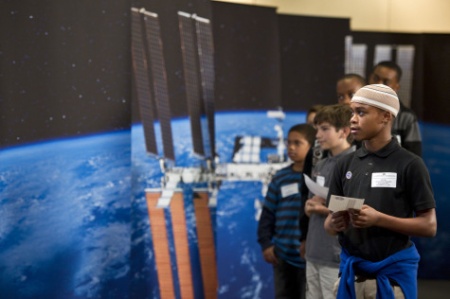Benefits of Space: Education
 Access to education increases economic prospects, broadens opportunities for social mobility, and contributes to the empowerment of women and young girls. While remote and rural communities have traditionally struggled with access to education, space-based technologies, such as satellite communications technologies, are helping to bridge this access gap.
Access to education increases economic prospects, broadens opportunities for social mobility, and contributes to the empowerment of women and young girls. While remote and rural communities have traditionally struggled with access to education, space-based technologies, such as satellite communications technologies, are helping to bridge this access gap.
Technologies like web and videoconferencing and voice over Internet protocol allow educators and students to create virtual classrooms, regardless of physical locations. Other versions of distance learning allow learners to access web based course materials on their own schedules, and communication between students and teachers may take place through e-mails, message boards or video recordings. Tele-education has become so popular that many institutions worldwide now offer distance education options ranging from the simplest instruction to degree and doctoral programs.
Beyond facilitating programme delivery, space also plays an inspirational role in education. Classes on space topics often spark students' curiosity and imagination and encourage youth of both genders to become increasingly involved in the sciences.

For more information, see:
Information for Students
Regional Centres for Space Science and Technology Education (affiliated with the United Nations)
Educational Materials on Global Navigation Satellite Systems
Teacher's Guide to Plant Experiments in Microgravity
Space Law Education Curriculum
Drop Tower Experiment Series
Programme on Space Applications Fellowships
Internship opportunites with the Office for Outer Space Affairs
See below for recent documents relating to Education. For more documents, search the Documents Database.